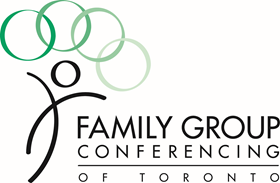
What is Family Group Conferencing?
Family Group Conferencing (FGC) is an alternative approach to working with and engaging families in the child protection context.
The main objective of FGC is to give the extended family group (i.e., nuclear family, extended family, and friends) a voice in the decision-making process to ensure the safety and well-being of children at-risk or in need of protection. FGC is a culturally sensitive, alternative approach to child protection that empowers marginalized families; bringing together family group members to craft a plan of care for their children that addresses concerns identified by child welfare/children’s mental health professionals.
A main benefit of the FGC process is that plans are developed for most of the children to return to or remain within their extended family systems.
Referrals to Family Group Conferencing
To make a referral for an Alternative Dispute Resolution Family Group Conference, please contact us at fgc@georgehull.on.ca or 416-622-8833 ext 218 to initiate the referral process.
Family members or service providers can make a referral to Family Group Conference.
If you are a parent or caregiver, please download our FGC Parent/Caregiver Handbook for more information about the FGC process.
What is Involved in a Conference?
During an FGC process, family group members (i.e., nuclear family, extended family, and friends) participate in the decision-making process to plan for a child(ren) that is at risk or in need of protection. There are two distinct phases to the FGC process:
The Preparation Phase: This phase involves the coordinator meeting individually with all family group members and service providers invited to a conference. The goal is to prepare prospective participants by providing them with information about the conferencing process as well as the strengths and concerns identified by the child welfare professionals involved with the family. This phase takes approximately 5 to 8 weeks.
The Conference Phase: Conferences usually are held on evenings or weekends and last approximately 5-6 hours. Additional conferences can be requested if the family wishes to review/revise a plan.
3 Segments to the Conference
Opening and Information Sharing is the beginning of the conference and is marked by a ceremony or ritual chosen by the family (e.g., prayer, circle, song etc) Both family members and professionals attend this segment. The coordinator outlines the purpose of the conference and each person is introduced.
Participants establish guidelines for a respectful process. Service providers present their reports and are available to answer questions. A speaker, at the request of the family, may address a topic relevant to the family (e.g., addictions, depression, death).
Family Private Time is the second stage. Family group members meet alone, without involvement of professionals or the coordinator, to craft a plan that addresses the child welfare concerns and ensures the future safety and well-being of the child(ren). This time also allows the family to share a meal and to discuss and share any intimate or confidential matters.
Review of the Plan is the final stage, when the family group presents their recommendation for a plan to the child welfare team. The plan is accepted if the child protection staff is assured that the child’s wellbeing and safety needs have been addressed.
Outcomes
An extensive research study of the Toronto FGC Project, conducted in 2004-2005, illustrated many positive outcomes of the FGC program, including:
- Significant reductions in involvement with child welfare;
- Significant reductions in the number of child welfare investigations;
- High percentages (89%) of children remaining within and returning to families both immediately and in the long-term, on average 3 years.
Ongoing program evaluation shows a high degree (over 80%) of agreement from both family members and professionals on the following statements:
- Family members felt safe and were free to disagree and voice their opinions.
- The conference process respected the family’s cultural values.
- The conference process helped the family group members and the professionals get along.
- The family group made decisions that were respected by the professionals.
- A clear plan for the children was developed that would protect their safety and wellbeing.